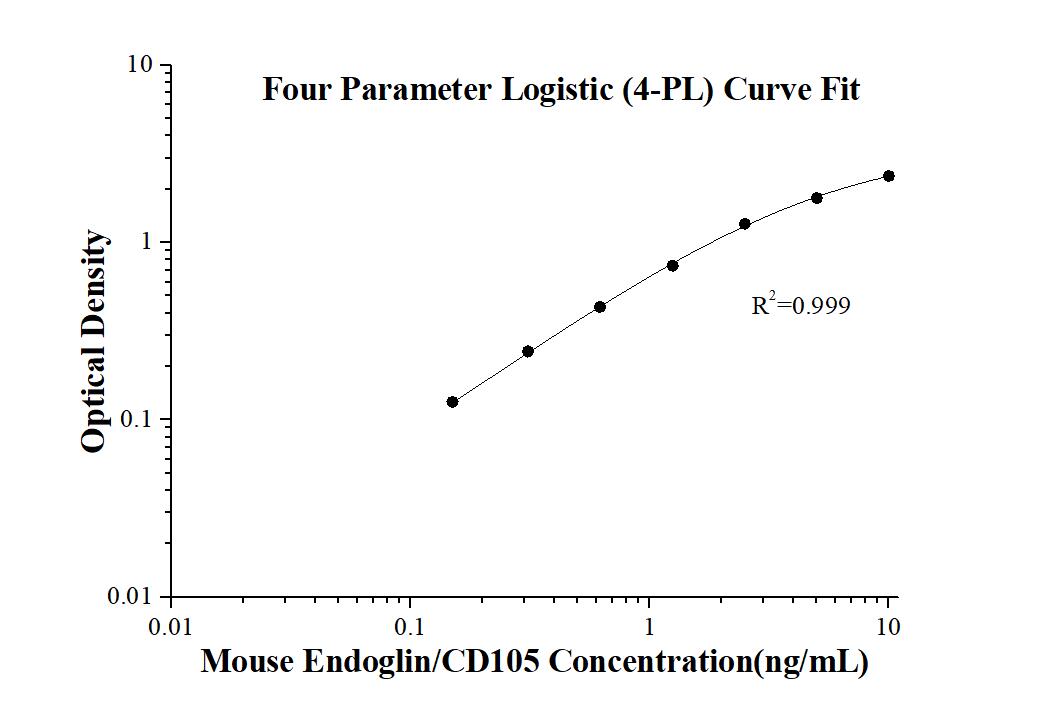Mouse Endoglin/CD105 ELISA Kit
Sensitivity
0.01 ng/mL
Range
0.156-10 ng/mL
Reactivity
Mouse
Cat no : KE10056
Synonyms
AI528660, AI662476, CD105, endoglin, Eng, S endoglin
Validation Data Gallery
Product Information
KE10056 is a solid phase sandwich Enzyme Linked-Immuno-Sorbent Assay (Sandwich ELISA). The Endoglin/CD105 ELISA kit is to be used to detect and quantify protein levels of endogenous Endoglin/CD105. The assay recognizes mouse Endoglin/CD105. An antibody specific for Endoglin/CD105 has been pre-coated onto the microwells. The Endoglin/CD105 protein in samples is captured by the coated antibody after incubation. Following extensive washing, another antibody of biotinylated specific for Endoglin/CD105 is added to detect the captured Endoglin/CD105 protein. For signal development, Streptavidin-HRP is added, followed by Tetramethyl-benzidine (TMB) reagent. Solution containing sulfuric acid is used to stop color development and the color intensity which is proportional to the quantity of bound protein is measurable at 450 nm with the correction wavelength set at 630 nm.
| Product name | Mouse Endoglin/CD105 ELISA Kit |
| Tests | 1 X 96 well plate |
| Sample type | Serum, Plasma, Tissue lysates |
| Assay type | Sandwich |
| Sensitivity | 0.01 ng/mL |
| Range | 0.156-10 ng/mL |
| Reactivity | Mouse |
| Tested applications | Sandwich ELISA |
| Gene ID (NCBI) | 13805 |
Recovery
| Sample Type | Average | Range |
|---|---|---|
| Mouse serum | 96% | 85%-100% |
| Tissue lysates | 89% | 79%-112% |
IntraAssay
| Sample | n | mean ( ng/mL) | SD | CV% |
|---|---|---|---|---|
| 1 | 20 | 4.67 | 0.20 | 4.4 |
| 2 | 20 | 0.99 | 0.04 | 4.2 |
| 3 | 20 | 0.23 | 0.01 | 4.2 |
InterAssay
| Sample | n | mean ( ng/mL) | SD | CV% |
|---|---|---|---|---|
| 1 | 24 | 5.06 | 0.49 | 9.7 |
| 2 | 24 | 1.09 | 0.08 | 7.5 |
| 3 | 24 | 0.25 | 0.02 | 6.2 |
Background Information
Endoglin (ENG, CD105) is a homodimeric cell membrane glycoprotein of 180 kDa, composed of disulphide-linked subunits of 90-95 kDa. Endoglin is a proliferation-associated and hypoxia-inducible protein mainly expressed on vascular endothelial cells. It acts as an accessory receptor for transforming growth factor beta (TFG-β) and is involved in vascular development and remodelling. The important role of Endoglin in angiogenesis and in tumor progression makes it an ideal target for antiangiogenic therapy and a good marker for tumor prognosis. The extracellular domain of membrane-bound Endoglin can be proteolytically cleaved, releasing a soluble form of Endoglin (sCD105). Increased levels of sCD105 are linked to the pathogenesis of severe vascular disease, and also correlate with poor prognosis in patients suffering from various types of cancer.
Properties
| Storage Instructions | All the reagents are stored at 2-8℃ for 6 months or -20℃ for 12 months. Refer to the protocol for further storage instructions. |
| Synonyms | AI528660, AI662476, CD105, endoglin, Eng, S endoglin |
